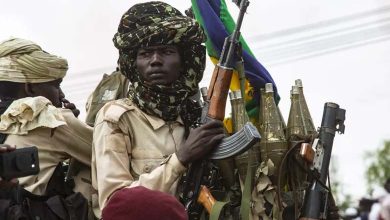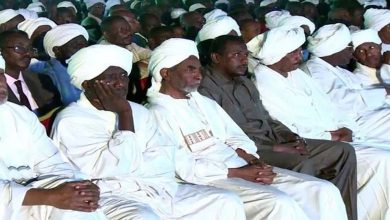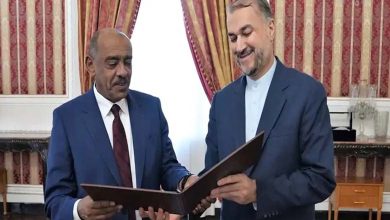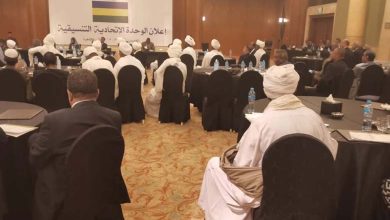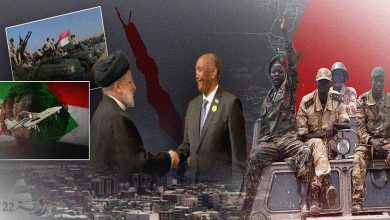Sudan War: Moussa Hilal, Founder of Militias, Makes Surprise Entry

The appearance of the former Janjaweed leader enriches the conflict arena and raises concerns for the army and Rapid Support Forces amid fears of tribal tension escalation.
Interpretations of political violence in Sudan point to the state’s role in either restraining or incentivizing armed rebel movements based on its belief that violence is a strategic function often resorted to, either to defeat them or to incentivize their organization and use for its benefit.
Among the many movements that still play a role and have a strong relationship with the characteristics of the ruling regime and the civil war in Darfur is the “Revolutionary Awakening Council,” led by Moussa Hilal, founder of the Janjaweed militias in 2003. He seeks to balance the armed movements list in Sudan, especially in Darfur where movements from African-rooted ethnicities belonging to tribes like Zaghawa, Fur, among others are prevalent. His forces also consist of African ethnicities, while the region is practically controlled by the Rapid Support Forces, which belong to the Arab-origin Rizeigat tribe and consist of Great Desert Arab tribes.
At this juncture, the former Janjaweed leader from the Mahamid tribe, one of the largest branches of the Rizeigat tribe, appears at the head of his movement to deny his involvement in the Sudanese war since last April in favor of the Rapid Support Forces, in response to a report by the UN expert committee accusing him of doing so.
Hilal’s appearance on the scene now neither denies nor conclusively confirms his cooperation with either side of the conflict as much as it confuses their calculations, being part of them at an earlier time. However, some may believe that he achieves some victory by aligning with the army, but this step will only lead to the collapse of the state, the ultimate outcome even if it occurs slowly because the government has failed to contain the behavioral challenges of armed movements effectively.
Army Exhaustion
The regime of Omar al-Bashir had a high capacity to suppress any form of opposition, represented by active political opposition, but the armed movements that rebelled against his regime in Darfur, their forces coming from outside the borders to launch attacks on Darfur region, contributed to regional instability and sparked the Chadian-Libyan war in 1987 in which several rebel movements participated and obtained “Land Cruiser” four-wheel-drive vehicles from it, used in their war against Sudanese government forces.
As the civil war in South Sudan drained the army due to the presence of militias affiliated with the Muslim Brotherhood known as the “People’s Defense Forces,” the al-Bashir regime also established the “Janjaweed” militias. Moussa Hilal was appointed to this task, as he was accused of inciting ethnic conflicts in some areas of Darfur, and was imprisoned in the 1990s on criminal charges including killing 17 people of African origin and robbing the Central Bank of Nyala.
In 2003, the governor of North Darfur ordered the imprisonment of Moussa Hilal in Port Sudan, but he was released in the same year by the then Vice President Ali Osman Taha, the second man in the Muslim Brotherhood organization after al-Turabi, until the reconciliation in 1999.
Taha invested in Hilal, taking advantage of the dispute between his Arab-origin ethnicities and the African ethnicities in Darfur, giving him the power to recruit and command Janjaweed forces formed in the transitional period after the April 1985 revolution that ended the rule of General Jaafar Nimeiry.
At that time, the Umma Party led by Sadiq al-Mahdi, which represented the majority in the transitional parliament, dispatched General Fadlallah Burma Nasser to distribute arms to Arab tribes in Darfur and Kordofan regions to protect them from the invasion of the Sudan People’s Army led by John Garang de Mabior, and the stated purpose was to arm the Arab tribes, known as “Murahaleen,” to protect their livestock from the SPLA’s targeting coming from the adjacent South Sudan region, but the main purpose was for these Arab militias to fight alongside the Sudanese government forces against the SPLA.
Motivating Militias
After the al-Bashir-Turabi regime seized power, it continued to arm tribes led by Moussa Hilal, and al-Bashir appointed him as an advisor with ministerial rank in the federal government bureau, while his forces remained stationed in the comfortable desert of North Darfur and succeeded in controlling a gold mine in Jebel Amer in Darfur.
The al-Bashir regime worked to motivate militias and sought to reward them to buy their loyalty and avoid any challenge to leadership. It continued to allocate funds and grant positions, manifested during that period in systematically recruiting targeted groups, including Islamists and the regional community in Darfur represented by Arab tribes, to constitute nepotism as a fundamental element in the ruling system, while the rest of the ethnicities were marginalized.
This situation continued until Moussa Hilal managed to control the areas of Saraf Umra, Kutum, Kabkabiya, and Alwaha in North Darfur from his stronghold in the comfortable desert. The government felt the danger of Hilal’s expansion and ordered his cousin, Mohamed Hamdan Dagalo “Hemeti,” to defect from him. Hemeti officially founded the Rapid Support Forces in 2013, structuring a part of the Janjaweed forces under the leadership of the National Security and Intelligence Service, then Hilal defected from the National Congress Party in 2014 and launched a new movement called the “Revolutionary Awakening Council.”
In 2017, severe disputes arose between the Sudanese government and Moussa Hilal over the “disarmament project” opposed by Hilal. When the government offered mediation, he demanded “the participation of the Awakening Council in the executive and legislative authority, real development projects and services in the nomadic areas, and resolution of the military dossier by integrating his forces with the Rapid Support Forces.”
At the same time, battles were fought between the Rapid Support Forces and an armed group affiliated with Moussa Hilal on one side, and the Rapid Support Forces alongside the Sudanese army in confronting rebel movements in Darfur, South Kordofan, and the Blue Nile, which united under the “Revolutionary Front” organization on the other side.
“Hemeti” Acts on Presidential Authority and Arrests Hilal and Several of His Sons and Movement Leaders after Battles in Which Hilal’s Son Was Killed, Then Subjected to Military Trial Because He Was Among the “Border Guards” Forces (Janjaweed) Affiliated with the Sudanese Armed Forces and Punished by Military Law, and Charges Were Leveled Against Him Including “Undermining the Constitutional System, Inciting Tribal Sentiments, Waging War against the State, and Rebelling against the Established Regime”, and Some of the Charges Against Him Could Lead to Execution if Convicted.
Conflict Escalation
During his detention, Hilal survived an assassination attempt by an unknown party while returning from the military court to his detention center, while the government ignored executing the judgment against him. Then a reconciliation was reached between him and “Hemeti”, and he remained in his prison even after the fall of the al-Bashir regime in 2019, and in 2021 a presidential decision was issued to release him after four years of imprisonment.
The United Nations had placed Hilal on its sanctions list after accusing him of committing violations against human rights and widespread atrocities against civilians during the conflict in Darfur, which claimed the lives of more than 300,000 people and displaced nearly 3 million, according to reports from 2006.
Hilal’s release raised concerns about escalating tensions and fueling tribal conflict in Darfur, but his activity remained limited during the past two years until the war broke out and he made statements last May describing the elements in the “Rapid Support Forces” as “mercenaries with no values”, stating that “these forces have no relation to the Rizeigat tribe or its history, and most of the forces now in the ‘Rapid Support’ are not Sudanese but have come from neighboring countries due to natural conditions such as famines, living conditions, and instability.”
Hilal urged young people from Arab tribes such as Al-Ateiba, Al-Rahimat, Al-Beni Halba, and other branches of the Rizeigat tribe such as Al-Mahariya, Al-Mahamid, and Al-Areiqat to withdraw from the forces and return to their families and clans, and he emphasized that “what is happening now is a sedition that will dismantle the Rizeigat tribes and will not stop there, but will extend to every region of Darfur, and after the war was in areas that could be resolved, now it will spread to all regions, even those that have not witnessed conflict before”.
Violence Bargaining
The establishment of these militias and their divisions indicate the military regime’s skill, represented by the era of al-Bashir, then the rule of the military wing the partner in the transitional period, then the monopoly of power again after Abdel Fattah al-Burhan’s coup in 2021, and they show that violence is a tool for political bargaining used by the ruling regime to achieve political goals, foremost of which is staying in power, and the regime used resources, positions, interests, and the judiciary to eliminate political opponents, benefiting from the weakness and divisions of the political elite.
The Sudanese regime’s long use of the “violence bargaining” strategy resulted in two outcomes: first, violence became one of the tools used by several active parties, either directly or indirectly by the involvement of civilian political forces behind one of the parties monopolizing violence, whether it is official represented by the government and its army or militias and armed movements. The second is that violence became the main supporter of political settlements.
The two results appear more clearly in the Darfur region, where the general governor of the region, Minni Arko Minawi, complained of the escalation of recruitment and mobilization in the region, in the context of the conflict between the army and the “Rapid Support Forces“.
Undermining Tribal Base
Despite Hilal’s imprisonment, many militias support him, and it is expected that the armed forces will try to benefit from him again by attracting Arab tribes to undermine the tribal base of the “Rapid Support Forces“.
Hilal, in turn, is expected to capitalize on the loyalty of scattered militias, especially after the High Executive Bureau of the “Revolutionary Awakening Council” dismissed him from his position for committing violations of the Council’s constitution, which included “involvement in recruiting council forces for the benefit of one of the conflict parties and participating in a campaign to release al-Bashir and working for the benefit of forces hostile to the 2018 uprising”.
These developments somewhat divert attention from the “Rapid Support Forces“, and this is starting to show in several signals: first, the United Nations renewed the listing of Hilal on its blacklist on charges of founding the “Janjaweed” militias that participated in genocide in Darfur, and Washington offered a reward of about $5 million for anyone who helps in the arrest of Ahmed Haroun, wanted by the International Criminal Court and accused of war crimes in Darfur.
The second indication is the international community’s focus on the principle of negotiation between the army and the “Rapid Support Forces” to stop the war and limit the sanctions imposed by the United States on companies affiliated with the two parties and not on their leadership.
The third is the emergence of Hilal’s star as a key player in founding militias, which will enable several parties to hold him fully responsible, weakening the position calling for holding the “Rapid Support Forces” accountable and clearing their arena from past crimes, achieving a great gain for the forces, even if it is limited to focusing on events in Darfur and ethnic cleansing in the city of Geneina during the current war, it will take several years before the charge is directly directed at the “Rapid Support Forces“.





